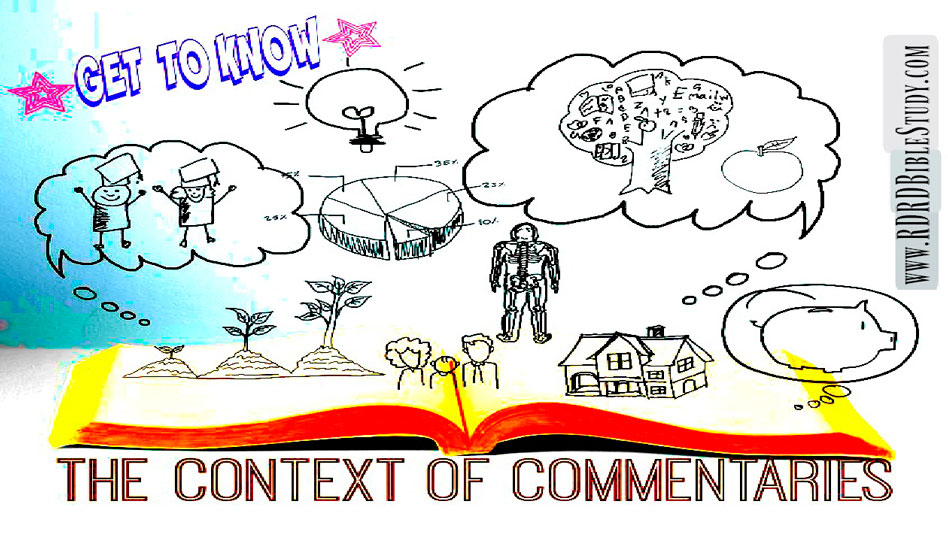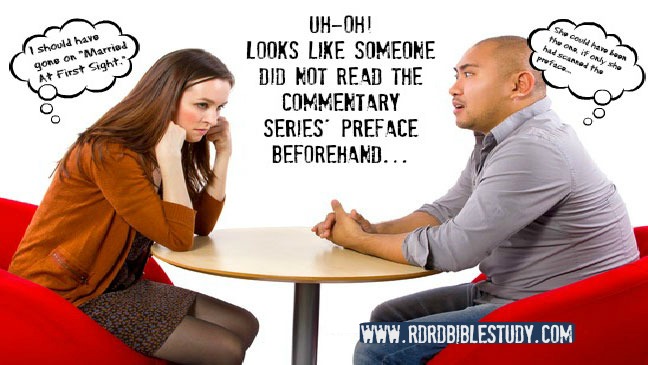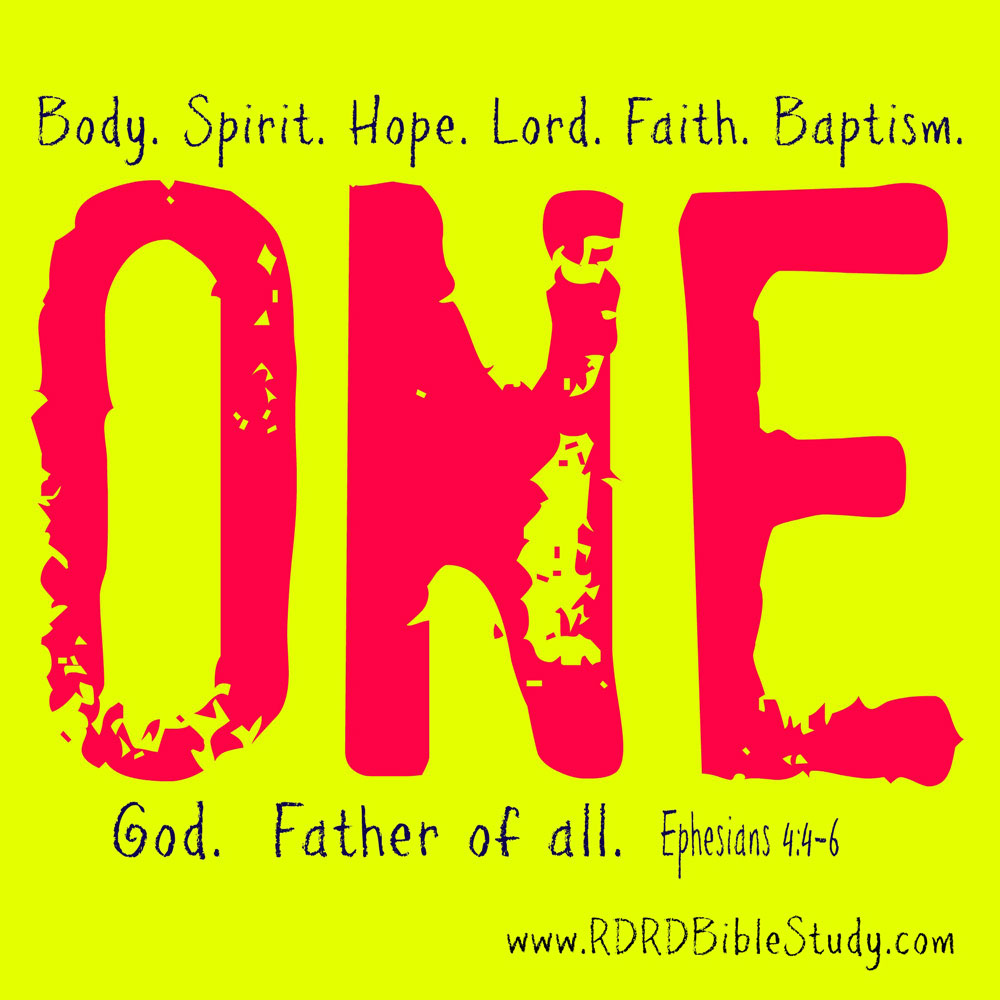Reading a commentary without knowing the context of the series and/or author is about as smart as being on the reality show “Married at First Sight.”
Someone (publishers, book sellers, and credit writers) will tell you this is the best commentary on the subject since sliced bread, or perhaps, sliced wedding cake. And maybe they are correct.
But to be on the safe side, unless you’ve read something by the author, or another commentary in the series, you really don’t know a single thing about the background of the words you will be allowing into your mind and heart.
Exactly like when you haven’t met someone that you have agreed to marry. You don’t know a single thing about the background of that person, their appearance, habits, or even the all-important toothpaste squeeze technique. Nothing. Nada. Zero. And yet you go on “Married at First Sight” and allow some complete stranger into your mind and heart.
Dogs have enough intelligence to get to know each other first before making any commitments. Whether you’re planning to be on “Married at First Sight” or reading a commentary for the first time, take advice from those who “nose”.
Seriously?
Seriously. Who would do that? Not you. You are way too intelligent.
When you marry someone you don’t know (or so I am assuming) you have no idea where this person is coming from. Likewise, with an otherwise unfamiliar commentary author or series—you have no idea where they are coming from, i.e. context.
So…
#1, please don’t agree to be on the reality show “Married at First Sight”…
or
#2 read a commentary you’ve never read before…
…without, at least, going on a first date with the one to whom you are entrusting your precious mind and heart.
First Dates
It’s pretty obvious how to go on a first date (at least) before getting married. But how do you go on a first date with a commentary?
Going on a first date with a commentary is not much different than a first date with a person. First, you meet up at the local Starbucks, library, or bookstore, and find a not-yet-too-cozy quiet corner (optional). From there, the goal is the same—you want to get to know the person. You want to know something about their background, their interests, and their beliefs.
You want to know their context.
Two smart guys on a first date with a commentary – getting to know something about the author and/or series. Unlike a first date with a person, you alone choose to go on this date, cuz obviously the book doesn’t have a choice.
Google “definition context”
…And you get this
Context: the circumstances that form the setting for an event, statement, or idea, and in terms of which it can be fully understood and assessed.
Did You Know That Context Is Omnipresent?
If RDRD Bible Study has pounded anything into your head so far, it is that “A text without a context is a pretext to a proof text.” Context is paramount when studying any single word of the Word.
When something is written or spoken about the Word, another context comes into play for the listener/reader. Context of the speaker, writer, circumstances, purpose, location, group, etc. Context is everywhere. Context is omnipresent.
So, how do you find the context of a commentary? Simple. Read the parts of the commentary that you normally skip, the beginning sections, usually named:
- Series Preface, aka Editor’s Preface
AND
- Author’s Preface, aka Preface, aka Introduction
Getting To Know The Context of Commentaries
Getting To Know the Author
Within the first pages of a commentary, you will find the author’s stated context in the “Author’s Preface.”
The post “Not All Commentaries Are Created Equally” discussed the significance of an author for an individual commentary. And in large part this is due to both the personal and professional context of the author—his/her research interests, writing style, denominational background, his/her confidence in the subject, commitment to doing the work, and relationship to Christ, are just a few slices of authorial context that make up the commentary context pie. Some of these you determine for yourself, i.e. writing style, some of the others may be found in what the author says in the preface.
Author’s Preface (sometimes Preface, sometimes at end of Introduction)
Read/scan the Author’s Preface. Mentally note professional or personal bits of information that the author shares.
If the person is a past or present missionary, his/her commentary may put an emphasis on the missiology of a text. If the writer is a pastor, he/she may emphasize the pastoral skills of a biblical character. But, what if he/she is a seminary professor? A hospital chaplain? A bi-vocational minister?
What if this person was born in the Bible belt? New York? London? Korea? Has four grown children? Has two little children? Married to an attorney? An airplane pilot? Etc. etc.
Because these factors make up the author’s context, they will all inform–in one way or another–the author’s understanding of the text. God chooses to work through people. And the Holy Spirit, always present in Bible Study because the Word and the Spirit cannot be separated, works with a person where they are.
Author’s Context Example
Let’s say you read two different commentaries on Romans.
- Commentary A is written by a career missionary.
- Commentary B is written by a pastor.
Commentator A may stress the missionary zeal of Paul, while the pastor may focus on Paul’s wisdom in dealing with conflict within a congregation.
Both are correct. Both are themes found in Romans. Both represent significant subjects for the church.
Or, what about Martin Luther, the father of the Protestant Reformation? His study of Romans stresses justification by faith through grace. Why? Luther led an ascetic lifestyle due to the historical context of a works-oriented Roman Catholic Church. Through his study of Galatians and Romans, he came to understand that salvation is a gift from God that a person receives by faith–not by works. Had Luther been born in any other century, or raised in any other church tradition, his primary focus may have been something besides “by faith alone.” From Luther’s personal and historical contexts (and Holy Spirit guidance) emerged some of Christianity’s greatest theological writings.
Regardless of whether a commentary was written during the 16th or 21st century, know something of the author’s background. And while reading a commentary, keep in mind that the author may stress certain themes of a book more than other themes, or apply the text in a different way. Understand why and you will get a huge benefit—you will gain a deeper and richer understanding of what you are reading.
Know where the author is coming from.
Diversity Side Note
As a practice, it is wise to read a diversity of commentaries for whatever you may be studying. In general, I make it a practice to read at least 6 different commentaries to get diverse perspectives. This is not a rule, just something an OT prof made us do and it has stuck with me.
You never know who/where/why/how/what the Holy Spirit will use to give you insight, understanding, or a treasured a-ha moment (John 3:8).
Series’/Editor’s Preface
Read/scan the Series Preface to determine the nuance and/or purpose of a commentary series. For instance, the authors of the New American Standard (NAS) series belong to the Southern Baptist denomination, so the interpretation accords with SB doctrine. A Presbyterian reading an NAS commentary may read something that sounds somewhat foreign to Presbyterian doctrine. Have a general awareness of the series’ intent and purpose.
This is your brain.
This is your brain on a bad date with a commentary.
Series’ differences aren’t all denominational. Some series focus on what the early church fathers said about Scripture. Some focus on the message of Christ. This is need-to-know info that the series’/editor’s preface will gladly tell you all about.
Understand the intent and purpose, and again, you will get a huge benefit—you will gain a deeper understanding about what you are reading.
Be aware that the series/editor preface may override the background of the writer. A seminary professor normally writes with academic rigor. But if the commentary series’ purpose is to provide a high-level overview of a biblical book, then the professor will write accordingly. But the benefit of knowing the context of commentaries remains—know this and you will gain a deeper understanding about what you are reading.
Conclusion
When consulting a commentary, take time to check out the context. This time will prove invaluable as you “consult” the commentary. The commentary is a professional service and you are the client. Spend time up front getting to know the “consultants.” It will add 10-15 minutes to your reading time—for every different commentary—and this small investment will reap huge dividends later.
All of us, whether we teach, blog, write, study, etc., need to be exposed to multiple theological perspectives. There is a diverse religious world out there and perhaps no category has as many subcategories as those falling under the heading “Christian.”
As Christians, whether we are teachers, preachers, bloggers, students, small group leaders, church members, etc., we especially need to be exposed to those perspectives faithful to the message of Jesus Christ. It is a great way to
- sharpen our own beliefs,
- appreciate how our similarities far outweigh our differences, and
- fully recognize that we are all members of One Body, Jesus Christ.
There is one body and one Spirit- just as you were called to the one hope that belongs to your call- 5 one Lord, one faith, one baptism, 6 one God and Father of all, who is over all and through all and in all. Ephesian 4:4-6
TOTALLY OPTIONAL HOMEWORK THAT YOU WILL BE GLAD YOU DID
Fun & Interesting Task: Look at 2 commentaries on the same Biblical book, each from a different series. Read or scan the Series’ Preface and Author’s Preface (or Introduction) from each. Answer the following:
1) Name of the Bible book.
2) What is the series and what is its purpose?
Book 1 –
Book 2 –
3) Who is the author and what information did you read about him/her that may influence how the book is interpreted?
Book 1 –
Book 2 –
4) Post your results in the comments or on Facebook. As iron sharpens iron, so one blog reader/commenter sharpens another. (Prov. 27:17)
Here is my totally optional homework:
And yes, I just did it.
1) Jonah
2)
Book 1 – Concordia, purpose is “…to assist pastors, missionaries, and teachers of the Scriptures to convey God’s Word with greater clarity, understanding, and faithfulness to the divine intent of the text.” From scanning the preface, the series has a high view of Scripture and it is Christ-centered (Christocentric) and in fact, describes itself as “Christological commentaries”. The theology is Lutheran, thus the name “Concordia” from the “Book of Concord” (1580), an exposition of Scripture written by Martin Luther.
Book 2 – The JPS (Jewish Publication Society) Bible Commentary – (both the series and author info is in one Preface), commitment to “academic rigor, which aims at uncovering the original meaning of the Book of Jonah; and a Jewish commitment to Scripture as the taproot of our national existence and wellspring of our religious life.”
[**note, one commentary high Christology, one purely Jewish – this is the kind of diversity that really benefits learning]
3)
Book 1 – R. Reed Lessing – the author is a professor of Hebrew at a seminary; Dr. Lessing has detailed analysis of every Hebrew phrase in Jonah; also the author’s pastoral qualities in a teaching context can be sensed.
Book 2 – Uriel Simon – reading the preface, you get a sense of the author’s deep respect for the Hebrew Bible; he also thanks his translator for the “English rendering”, in other words, the author did not look up some Hebrew words online, nor did he study Hebrew in seminary. Hebrew is his native language. (awesome! I always get a lot from the JPS series, unfortunately every OT book does not have a JPS commentary).
I look forward to reading your homework, er-uh, fun and interesting task.
Until next time –
The grace of the Lord Jesus Christ and the love of God and the fellowship of the Holy Spirit be with you all. 2 Corinthians 13:14













